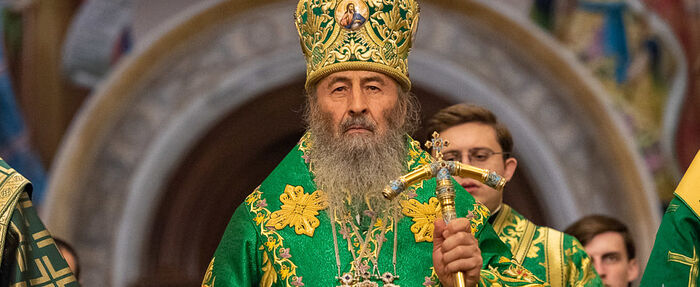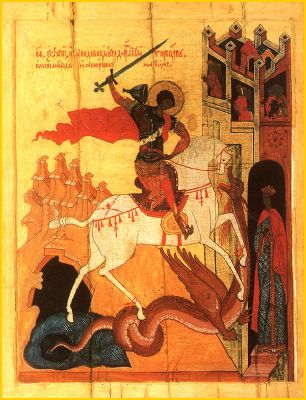How can we restore unity to world Orthodoxy and overcome the schism? What do the schism of 1054 and the current Church rupture have in common? What is needed to restore Eucharistic communion between the Phanar and the Russian Orthodox Church? Is there a threat to Ukrainian Orthodoxy from the Muslim world? How should the Church and its clergy carry out their mission today, and how do today’s trials affect the spiritual life of the faithful?
Life & Faith
The Holy Apostle Matthew the Evangelist
*November 29 / November 16
Matthew, son of Alphaeus, was a tax collector when the Lord saw him in Capernaum and said: Follow Me. And he arose, and followed Him (Matt 9:9). After that, Matthew prepared a reception for the Lord in his home and thus provided the occasion for the Lord to express several great truths about His coming to earth. After receiving the Holy Spirit, Matthew preached the Gospel to the Parthians, Medes and Ethiopians. In Ethiopia he appointed his follower Plato as bishop, and withdrew to prayerful solitude on a mountain, where the Lord appeared to him. Matthew baptized the wife and the son of the prince of Ethiopia, at which the prince became greatly enraged and dispatched a guard to bring Matthew to him for trial. The soldiers returned to the prince saying that they had heard Matthew’s voice, but could not see him with their eyes. The prince then sent a second guard. When this guard approached the apostle, he shone with a heavenly light so powerful that the soldiers could not look at him; filled with fear, they threw down their weapons and returned. The prince then went himself. Matthew radiated such light that the prince was instantly blinded. However, the holy apostle had a compassionate heart; he prayed to God, and the prince was given back his sight. Unfortunately, he saw only with physical eyes and not spiritual eyes. He arrested Matthew and subjected him to cruel tortures. Twice, a large fire was lighted on his chest, but the power of God preserved him alive and unharmed. Then the apostle prayed to God and gave up his spirit. The prince commanded that the martyr’s body be placed in a lead coffin and thrown into the sea. The saint appeared to Bishop Plato and told him where the coffin bearing his body could be found. The bishop retrieved the coffin with Matthew’s body from the sea. Witnessing this new miracle, the prince was baptized and received the name Matthew. After that, the prince left all the vanity of the world and became a presbyter and served the Church in a God-pleasing way. When Plato died, the Apostle Matthew appeared to the presbyter Matthew and counseled him to accept the episcopacy. He accepted the bishopric and, for many years, was a good shepherd until the Lord called him to His Immortal Kingdom. St. Matthew the Apostle wrote his Gospel in the Aramaic language. It was soon after trans- lated into Greek and the Greek text has come down to us, while the Aramaic text has been lost. It is said of this evangelist that he never ate meat, but only vegetables and fruit.
Saint John Chrysostom, Patriarch of Constantinople
(November 26 / November 13)
John was born in Antioch in the year 354. His father, Secundus, was an imperial commander and his mother’s name was Anthusa. Studying Greek philosophy, John became disgusted with Hellenic paganism and adopted the Christian Faith as the one and all-embracing truth. Meletius, Patriarch of Antioch, baptized John, and his parents also subsequently received baptism. Following his parents’ repose, John was tonsured a monk and lived a strict life of asceticism. He then wrote a book, On the Priesthood, after which the Holy Apostles John and Peter appeared to him, and prophesied that he would have a life of great service, great grace and great suffering. When he was to be ordained a priest, an angel of God appeared simultaneously to John and to Patriarch Flavian (Meletius’s successor). While the patriarch was ordaining John, a shining white dove was seen hovering over John’s head. Glorified for his wisdom, asceticism and power of words, John was chosen as Patriarch of Constantinople at the behest of Emperor Arcadius. As patriarch, he governed the Church for six years with unequaled zeal and wisdom. He sent missionaries to the pagan Celts and Scythians and eradicated simony in the Church, deposing many bishops guilty of this vice. He extended the charitable works of the Church and wrote a special order of the Divine Liturgy. He shamed the heretics, denounced Empress Eudoxia, interpreted Holy Scripture with his golden mind and tongue, and bequeathed the Church many precious books of his homilies. The people glorified him, the envious loathed him, and the Empress, on two occasions, sent him into exile. John spent three years in exile, and reposed as an exile on the Feast of the Elevation of the Precious and Life-giving Cross, September 14, 407, in the town of Comana in Georgia. Before his repose, the Holy Apostles John and Peter appeared to him again, as did the Holy Martyr Basiliscus (May 22) in whose church he received Communion for the last time. His last words were, “Glory be to God for all things,” and with that, the soul of the golden-mouthed patriarch was taken into Paradise. Chrysostom’s head reposes in the Church of the Dormition in Moscow, and his body reposes in the Vatican in Rome.
St. John the Merciful, Patriarch of Alexandria (620)
(November 25 / November 12)
John was born on the island of Cyprus. His father was Prince Epiphanius. John was raised as a true Christian from childhood. At the insistence of his parents, he married and had children. However, by God’s providence, his wife and children passed from this world into the next. Renowned for his compassion and piety, John was chosen as Patriarch of Alexandria in the time of Emperor Heraclius. He governed the Church of Alexandria for ten years as a true shepherd, safeguarding it from pagans and heretics. He was a model of meekness, charity and love for his fellow men. He said: “If you desire nobility, seek it not in blood but in virtues, for this is true nobility.” All the saints have been distinguished by merciful- ness, but St. John was completely dedicated to this wonderful virtue. Once, while celebrating the Liturgy, the patriarch remembered the words of Christ, Therefore if thou bring thy gift to the altar, and there rememberest that thy brother hath aught against thee, leave there thy gift before the altar, and go thy way; first be reconciled to thy brother, and then come and offer thy gift (Matthew 5:23–24), and he remembered that one of the clergy in that church had a grievance against him. He quickly left the Holy Gifts, approached that priest, fell before his feet and begged for forgiveness. And only when he had made peace with this man did he return to the table of oblation. Another time, as he was on his way to the Church of Saints Cyrus and John, it happened that he met a needy and unfortunate widow who spoke to him at length about her misfortune. The patriarch’s escorts became bored by the woman’s lengthy complaint, and urged the bishop to hurry to the church for the service, intimating that he could hear the woman’s story afterward. John said to them: “And how will God listen to me, if I do not listen to her?” He would not leave until he heard the widow’s complaint to the end.
When the Persians attacked Egypt, Patriarch John boarded a boat to escape from danger. Along the way he fell ill and, when he arrived in Cyprus, he reposed at his birthplace, in the year 620. After he entered the Immortal Kingdom of his Lord, his miracle-working relics were translated to Constantinople, then to Budapest, and finally to Presburg.
We Commune, Aware That We Are the Dust of the Earth
 An Interview with the Ukrainian Primate, Metropolitan Onuphry
An Interview with the Ukrainian Primate, Metropolitan Onuphry
Feast of the Translation of the Relics of Saint George
 On this day we commemorate the translation of the relics of St. George, from Nicomedia, where he suffered at the time of Emperor Diocletian, to the city of Lydda in Palestine. The suffering of this wonderful saint is described on April 23. Anticipating his martyrdom, St. George begged his servant to take his relics to Palestine, where his mother had been born, and where he had distributed his large estate to the poor. The servant did so. During the reign of Emperor Constantine, pious Christians built a beautiful church to St. George in Lydda and, upon the consecration of that church, the relics of the saint were interred there. Innumerable miracles have occurred from these miracle-working relics of St. George, the great-martyr of Christ.
On this day we commemorate the translation of the relics of St. George, from Nicomedia, where he suffered at the time of Emperor Diocletian, to the city of Lydda in Palestine. The suffering of this wonderful saint is described on April 23. Anticipating his martyrdom, St. George begged his servant to take his relics to Palestine, where his mother had been born, and where he had distributed his large estate to the poor. The servant did so. During the reign of Emperor Constantine, pious Christians built a beautiful church to St. George in Lydda and, upon the consecration of that church, the relics of the saint were interred there. Innumerable miracles have occurred from these miracle-working relics of St. George, the great-martyr of Christ.
Holy Wonderworkers and Unmercenaries Cosmas and Damian
Cosmas and Damian were unmercenaries and miracle-workers. They were brothers both in the flesh and in the spirit, born somewhere in Asia Minor of a pagan father and a Christian mother. After their father’s death, their mother St. Theodota devoted all her time and effort to educating her sons and raising them as true Christians. God helped her, and her sons matured as sweet fruit and luminaries of the world. They were learned in the art of medicine and ministered to the sick without payment, not so much with medicine as by the name of the Lord Jesus Christ. They were called “unmercenary physicians,” that is, unpaid physicians, for they healed freely and thus fulfilled the commandment of Christ: Freely ye have received, freely give (Matthew 10:8). So careful were they in healing men free of charge that Cosmas became very angry with his brother Damian because he accepted three eggs from a woman, Palladia, and ordered that he not be buried alongside his brother Damian after his death. In fact, St. Damian did not accept these three eggs as a reward for healing the ailing Palladia, but rather because she adjured him in the name of the Most-holy Trinity to accept these three eggs. Nevertheless, after their death in the town of Fereman, they were buried together according to a revelation from God. The holy brothers were great miracle-workers both during their life and after their death. A snake crawled through the mouth and into the stomach of a certain farm laborer during his sleep, and the unfortunate man would have died in the greatest pain had he not, in the last moment, invoked the help of Saints Cosmas and Damian. Thus, the Lord glorified forever the miracle-working of those who glorified Him on earth by their faith, purity and mercy.

